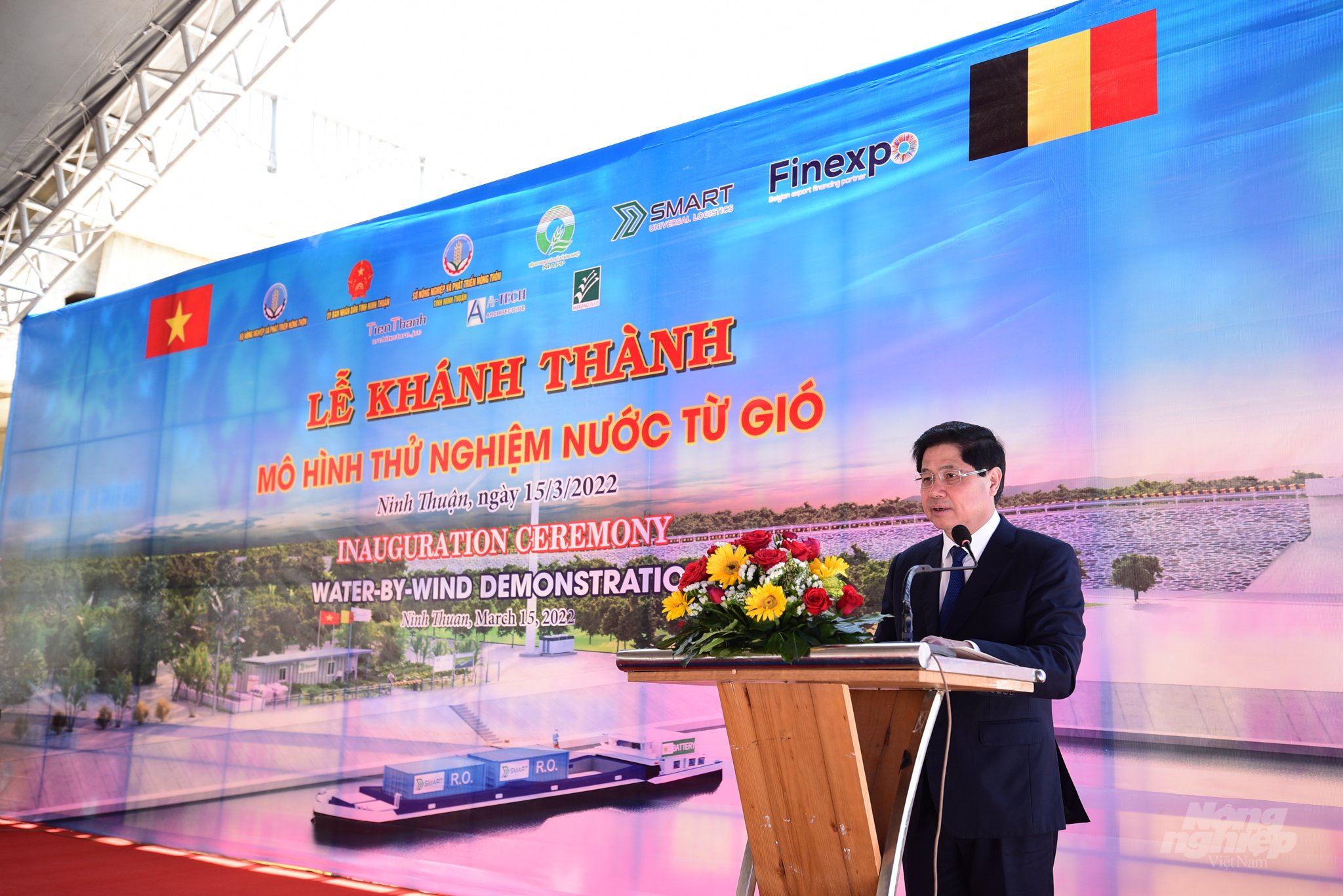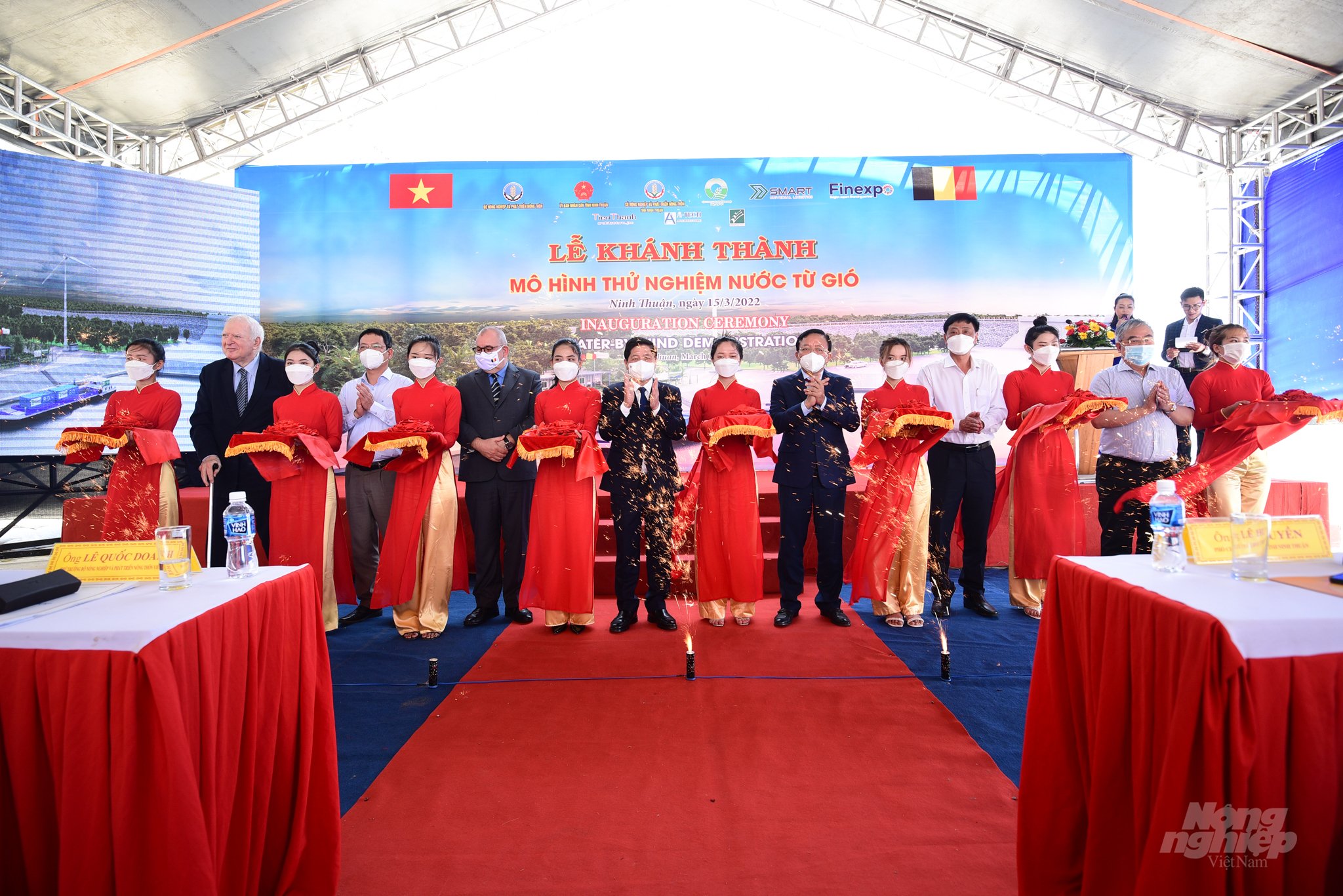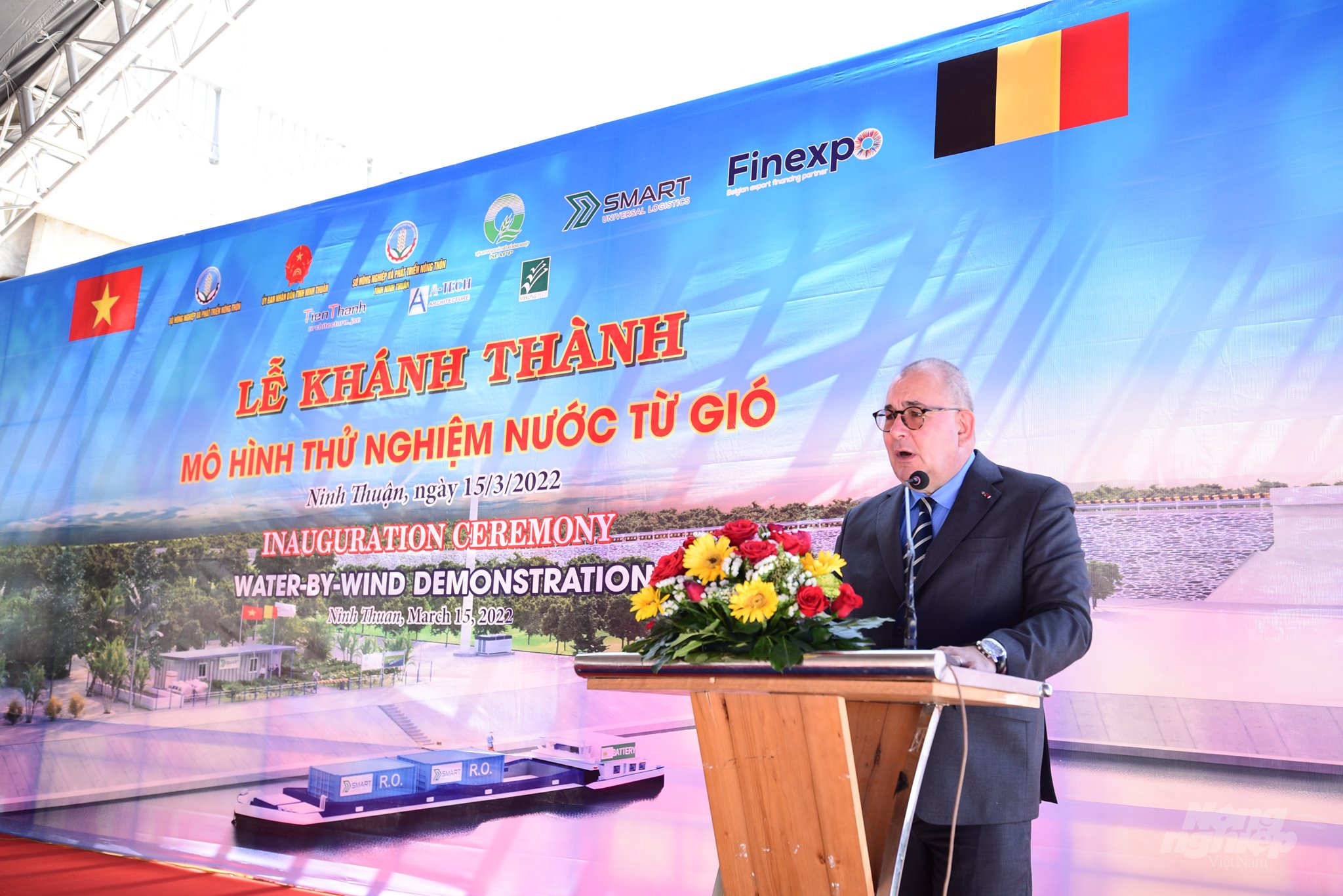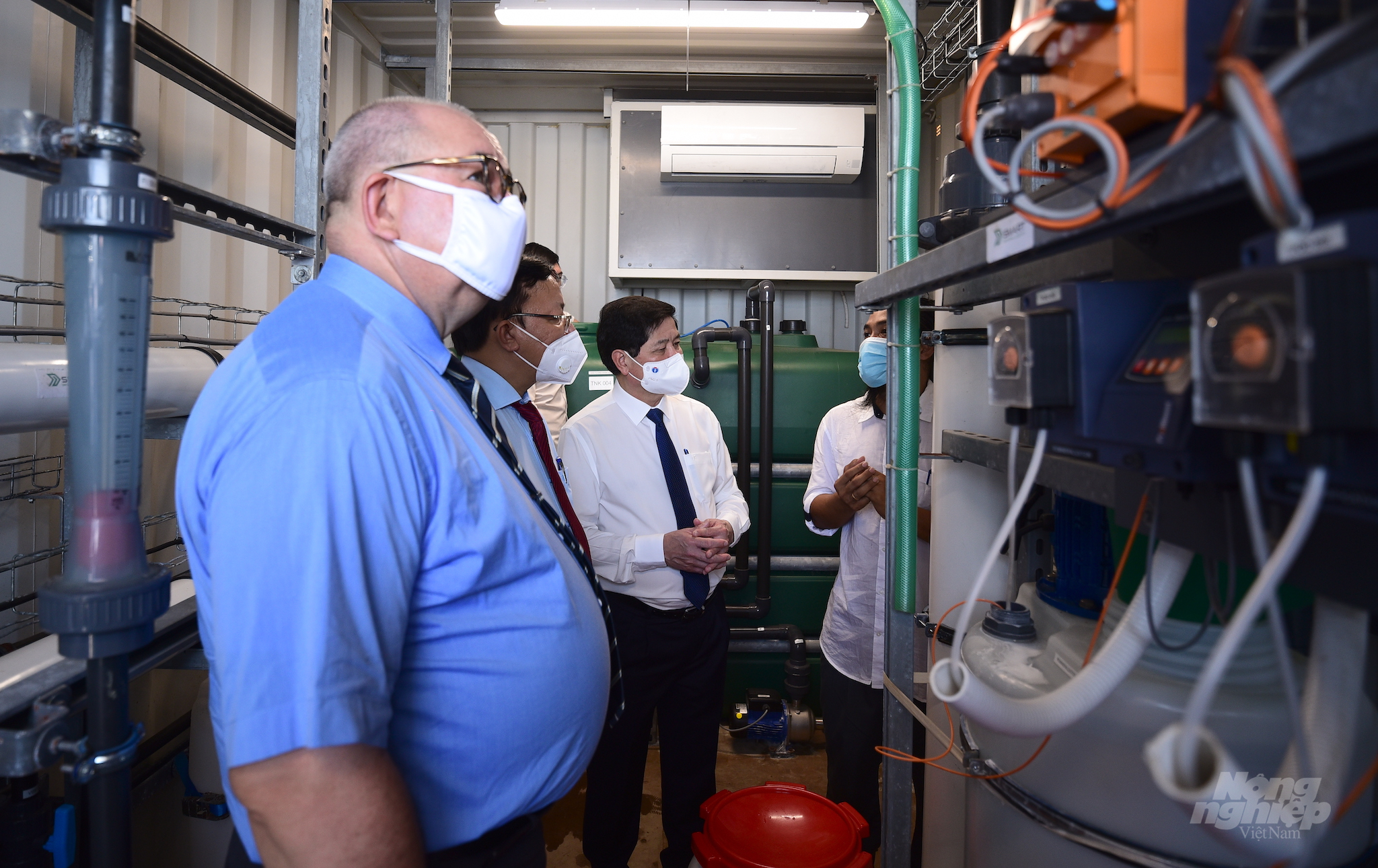May 22, 2025 | 06:28 GMT +7
May 22, 2025 | 06:28 GMT +7
Hotline: 0913.378.918
May 22, 2025 | 06:28 GMT +7
Hotline: 0913.378.918

Deputy Minister Le Quoc Doanh highly appreciated the desalination capacity and mobility of the project model "Water by Wind demonstration" in Ninh Thuan. Photo: Tung Dinh.
The inauguration ceremony of the “Water by Wind demonstration" project on March 15 featured MARD Deputy Minister Le Quoc Doanh, Belgium Ambassador in Vietnam Paul Jansen; Director of Smart Universal Logistic Marc Stordiau; Vice-Chairman of Ninh Thuan Provincial People’s Committee, and representatives of relevant units and localities.
The "Water by Wind demonstration" project is being conducted in Ninh Thuan, which is located at the intersection of three key economic interregional areas: the Southeast, the South-Central Coast, and the Central Highlands.
Vietnam, according to MARD Deputy Minister Le Quoc Doanh, is one of the most vulnerable countries to climate change's effects. Extreme weather events and increasing sea levels are posing a significant impact on food and water security, as well as interrupting sustainable development in Vietnam, particularly agricultural production.
As a result, MARD is extremely appreciative of the Belgian government's funding of a project in Ninh Thuan, the region of drought and wind, to create solutions for water supply for agricultural production and daily living in places with hard natural conditions.
"The model's highlight is its ability to easily access and move to different saline lines throughout the year to provide fresh water to people inside of an emergency; its simplicity and low cost of operation and maintenance; and its ability to run entirely on renewable energy while contributing to the local power grid," said Deputy Minister Le Quoc Doanh.
Additionally, the Deputy Minister praised the Institute of Agricultural Planning and Design's staff for their effective collaboration with Belgian experts, as well as their collaboration with Ninh Thuan provincial authorities and relevant agriculture agencies throughout the project's implementation process.
Deputy Minister Le Quoc Doanh also requested that the project owner coordinates with Ministry officials and Belgian partners to review the project's experiences and outcomes in order to popularize and replicate the model on a national scale, thereby contributing to the sector's sustainable development in the direction of ecological agriculture, modern rural areas, and civilized farmers.
Following an evaluation of the water purification system in An Hai commune, the agriculture sector's chief lauded the system's performance in turning roughly water of 40-50% salty into freshwater for everyday usage. He did, however, mention the possibility of transferring and operating the model in other localities in the near future.

The inauguration ceremony of the project model "Water by Wind demonstration" in An Hai commune, Ninh Phuoc district (Ninh Thuan) on the morning of March 15. Photo: Tung Dinh.
Belgium Ambassador to Vietnam Paul Jansen stated during the inauguration that the event marked a significant milestone in the two countries' cooperation under the 2018 agriculture sector strategic partnership agreement.
According to Mr. Jansen, the saline intrusion is a major trouble for the Mekong Delta and the South Central region, and Belgium is collaborating with Vietnam on a number of initiatives to address the relevant obstacles.
"The Water by Wind initiative is one-of-a-kind and original. The first phase, which was opened today in Ninh Thuan, marks a historic start for the construction of more desalination projects within the network in Vietnam in the near future, with a total expenditure of around USD 12 million," Ambassador Paul Jansen stated.
Ninh Thuan is also home to a number of cooperative agriculture initiatives from Belgium, including those aimed at managing water resources in the face of climate change.
Ambassador Jansen anticipated that Belgium-Vietnam agricultural strategic cooperation will facilitate the development of several projects, provide numerous production options, and assist Vietnamese agricultural goods in more successfully accessing the European market.
Mr. Marc Stordiau, Director of Smart Universal Logistic, the unit responsible for the project's implementation, stated that during phase 1, the desalination system would be powered by the electrical grid to ensure proper functioning.
Once the output water quality is assured and the system is operating well, a turbine system will be constructed to utilize wind energy to power the process of saltwater purification into freshwater.
Mr. Stordiau asserts that when the grid-wind energy conversion system operates efficiently, the cost of maintaining and replacing the reverse osmosis membrane system is kept to a minimum.
For the local part, Vice Chairman of Ninh Thuan Provincial People's Committee Le Huyen confirmed that in addition to climate change adaptation projects such as Tan My Irrigation, a saline prevention sluice downstream of the Dinh River, and the "Water by Wind demonstration" project, clean water shortages in daily life and production will be addressed.

Belgian Ambassador to Vietnam Paul Jansen said that a series of projects related to climate change adaptation funded by the Belgian Government in Vietnam will be implemented in the near future. Photo: Tung Dinh.
The Institute of Agricultural Planning and Design proposed and administered the project in collaboration with the Department of Agricultural and Rural Development under the auspices of the Belgian Government (represented by Finexpo Fund) and Smart Universal Logistics. From August 2020 to March 2022, the project is implemented.
The project "Water by Wind" utilizes renewable energy sources (wind and sun) to power a desalination system that produces freshwater for agricultural productivity and daily living in coastal areas afflicted by drought and saltwater intrusion.
The "Water by Wind" project is expected to have two phases: phase one will involve the installation and demonstration of a desalination system, evaluating and adjusting technical issues to ensure that the quality/quantity of water meets the requirements of technical standards for production and daily life in Vietnam, thereby ensuring optimal economic, social, and environmental efficiency.
Following that, phase 2 will focus on identifying domestic partners and planning to localize the desalination system to lower investment costs, with the goal of replicating the desalination system in Vietnam and other Southeast Asian nations.

From left to right, Ambassador Paul Jansen, Vice Chairman of Ninh Thuan Provincial People's Committee Le Huyen, and Deputy Minister Le Quoc Doanh are explained the operating mechanism of the system by the model operator. Photo: Tung Dinh.
The "Water by Wind" model's operating principle
Initially, energy generated by wind turbines and solar panels is stored in the BESS battery system, which then supplies energy to the desalination system.
Following that, the BESS battery system assists in supplying steady energy to the desalination process. The energy created in excess during the desalination process can be sent back into the national grid.
The desalination system will work in the following manner: Pumping, Pretreatment (filtering), Sedimentation (coagulation-flocculation-filtration), Multi-media filter, Ultrafiltration (UF), Reverse osmosis (RO), Regeneration and Disinfection, Tank for Treated Water
The project "Water by Wind demonstration"
The Belgian government is sponsoring the "Water by Wind demonstration" initiative with a non-refundable grant of EUR 700,000 between 2020 and 2022. The project's objective is to conduct demonstration research on solutions for providing water for agricultural production and daily life in areas with harsh natural conditions, such as the South-Central Coast provinces and the Mekong River Delta, using wind and solar energy-based water desalination systems.
The project, which is now being tested in Ninh Phuoc district, Ninh Thuan province, has completed phase 1, having been inaugurated on March 15, and will continue through the end of 2022. The model's projected capacity during the test phase is 20 m3 of freshwater per day.
Translated by Linh Linh
![Reducing emissions from rice fields: [2] Farmers’ commitment to the soil](https://t.ex-cdn.com/nongnghiepmoitruong.vn/608w/files/news/2025/05/05/dsc08881jpg-nongnghiep-140632.jpg)
(VAN) Clean rice cultivation model in Thuong Tan commune, Bac Tan Uyen district, is assisting local residents in achieving sustainable agriculture by substantially reducing costs, increasing productivity, and protecting the environment.

(VAN) At the conference to disseminate Resolution No. 68, AgriS introduced its digital agricultural ecosystem and reaffirmed its commitment to accompanying the Government in promoting private sector development and sustainable agriculture.

(VAN) 'Blue Ocean - Blue Foods' initiative is designed to restore marine ecosystems and establish sustainable livelihoods for local communities by cultivating a minimum of 1,000 hectares of cottonii seaweed in the first three years.
/2025/05/21/4642-3-112707_603.jpg)
(VAN) The V-SCOPE project has made direct contributions to three out of six pillars of the Comprehensive Strategic Partnership between Vietnam and Australia.

(VAN) Facing the threat of rabies spreading to the community, Gia Lai province urgently carries out measures to vaccinate dogs and cats on a large scale.

(VAN) Disease-free livestock farming not only protects livestock herds but also stabilizes production and livelihoods for many farmers in Tuyen Quang.

(VAN) Japan's grant aid project contributes to capacity building, promoting organic agricultural production, and fostering sustainable community development in Dong Thap province.